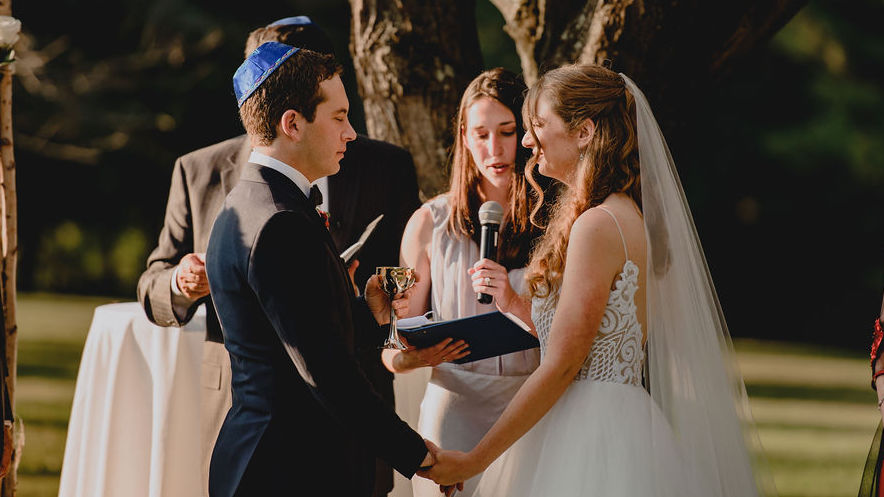Rabbis will answer this question differently! In my book, a Jewish wedding is a wedding between two people, at least one of whom is Jewish, where both partners want Judaism to be a meaningful part of their wedding and marriage.
I encourage couples to include at least these three ritual parts in their ceremonies: ketubah (wedding contract), a chuppah (wedding canopy), and sheva brachot (seven blessings)—but who are we kidding, everyone wants to break the glass, too!
Ketubah
The ketubah is an ancient wedding contract that has been signed by couples for thousands of years. Originally this was the legal wedding contract; today it mostly serves as an expression of your values as a couple. The most important part of the ketubah is the two lines at the bottom for witnesses to sign. These witnesses, much like witnesses for the civil license, are signing to affirm that you and your partner are willingly entering into your marriage.
You are responsible for choosing your own ketubah and I work with you and the designer to proof any Hebrew text before it’s printed. If you have a Hebrew name, it’s typically included in your ketubah. Etsy, Ketubah.com, and individual artists such as NJ-based Adriana Saipe are great places to find a ketubah you love.
Chuppah
The chuppah is a wedding canopy, typically constructed with four poles or posts with some kind of fabric or floral covering. You can choose to use a tallit or prayer shawl as a covering, but a plain piece of fabric works well, too! The chuppah can be simple or ornate—it’s completely your choice! Florists can often construct a chuppah or a handy relative can build one! The chuppah symbolizes hospitality because it’s open on all sides. It also represents the new home that you are creating as a newly married couple.
Sheva Brachot / Seven Blessings
These blessings are the core traditional text of a Jewish wedding. They are made up of seven blessings that express gratitude to God. You have a lot of options when it comes to these blessings! Many couples choose to have me recite blessings in Hebrew and then they select an interpretive translation that remains loyal to the themes of the text. This is also a wonderful moment to involve family, friends or your bridal party in your ceremony by inviting them to read the blessings.
Other Traditions
Other traditions we’ll discuss together are the blessing for the couple, circling, kiddush, kippot/yarmulkes, yichud, havdalah, memorial/memory moment, ring exchange, and breaking the glass.
